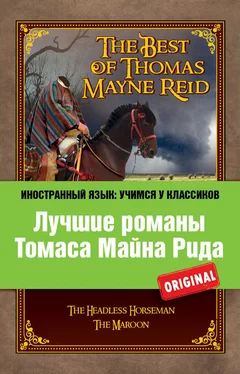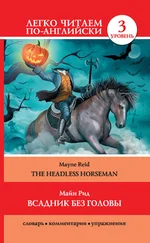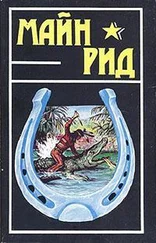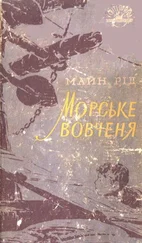His resolve was soon taken.
“Thanks!” said he. “Thanks, cousin Kate!” he added, with increasing warmth. “ You have meant kindly, and though we may never meet again – ”
“Oh, say not so!” interrupted the young girl, with an appealing look.
“Yes,” continued he, “it is probable we never shall. Here there is no home for me. I must go hence; but, wherever I may go, I shall not soon forget this kindness. I may never have an opportunity of repaying it – you are beyond the necessity of aught that a humble relative could do for you; but remember, Kate Vaughan! should you ever stand in need of a strong arm and a stout heart, there is one of your name who will not fail you!
“Thanks!” he repeated, detaching the ribbon from the bag, and flinging the latter, with its contents, back through the open window. Then, fastening the ribbon to the breast-button of his coat, he added: “I shall feel richer with the possession of this token than with all the wealth of your father’s estate. Farewell! and God bless you, my generous cousin!”
Before the young Creole could repeat her offer, or add another word of counsel or consolation, he had turned the angle of the building, and passed out of sight.
Chapter 20
The Jew’s Penn
[481]
While these scenes were transpiring upon the plantation of Mount Welcome, others of a still more exciting nature were being enacted on that which adjoined it – the property of Jacob Jessuron, slave-merchant and penn-keeper.
Besides a “baracoon” in the Bay, where his slaves were usually exposed for sale, the Jew was owner of a large plantation in the country, on which he habitually resided. It lay contiguous to the estate of the Custos Vaughan – separated from the latter by one of the wooded ridges already mentioned as bounding the valley of Mount Welcome.
Like the latter, it had once been a sugar estate, and an extensive one; but that was before Jessuron became its owner. Now it was in the condition termed ruinate . The fields where the golden cane had waved in the tropic breeze were choked up by a tangled “second growth,” restoring them almost to their primitive wildness. With that quickness characteristic of equatorial vegetation, huge trees had already sprung up, and stood thickly over the ground – logwoods, bread-nuts, cotton, and calabash trees, which, with their pendent parasites, almost usurped dominion over the soil. Here and there, where the fields still remained open, instead of cultivation, there appeared only the wild nursery of nature – glades mottled with flowering weeds, as the Mexican horn-poppy, swallow-worts, West Indian vervains, and small passiflorae .
At intervals, where the underwood permitted them to peep out, might be seen stretches of “dry wall,” or stone fence, without mortar or cement, mostly tumbled down, the ruins thickly trellised with creeping plants – as convolvuli, cereus, and aristolochia; cleome, with the cheerful blossoming lantana ; and, spreading over all, like the web of a gigantic spider, the yellow leafless stems of the American dodder.
In the midst of this domain, almost reconquered by nature, stood the “great house” – except in size, no longer deserving the appellation. It consisted rather of a pile than a single building – the old “sugar works” having been joined under the same roof with the dwelling – and negro cabins, stables, offices, all inclosed within an immense high wall, that gave to the place the air of a penitentiary or barrack, rather than that of a country mansion. The enclosure was a modern construction – an afterthought – designed for a purpose very different from that of sugar-making.
Garden there was none, though evidence that there had been was seen everywhere around the building, in the trees that still bloomed: some loaded with delicious fruits, others with clustering flowers, shedding their incense on the air. Half wild, grew citrons, and avocado pears, sop and custard apples, mangoes, guavas, and pawpaws; while the crown-like tops of cocoa-palms soared high above the humble denizens of this wild orchard, their recurvant fronds drooping as in sorrow at the desolation that surrounded them.
Close to the buildings stood several huge trees, whose tortuous limbs, now leafless, rendered it easy to identify them. They were the giants of the West Indian forest – the silk-cotton-tree ( Eriodendron anfractuosum ). The limbs of these vegetable monsters – each itself as large as an ordinary tree – were loaded with parasites of many species; among which might be distinguished ragged cactacae , with various species of wild pines, from the noble vriesia to the hoary, beard-like “Spanish moss,” whose long streaming festoons waved like winding-sheets in the breeze – an appropriate draping for the eyrie of the black vultures (John-Crows) that might at all times be seen seated in solemn silence upon the topmost branches.
In the olden time, this plantation had borne the name of “Happy Valley”; but during the ownership of Jessuron, this designation – perhaps deemed inappropriate – had been generally dropped; and the place was never spoken of by any other name than that of the “Jew’s Penn.”
Into a “penn” (grazing farm) Jessuron had changed it, and it served well enough for the purpose: many of the old sugar fields, now overgrown by the valuable Guinea grass, affording excellent pasturage for horses and cattle.
In breeding and rearing the former for the use of the sugar estates, and fattening the latter for the beef markets of the Bay, the industrious Israelite had discovered a road to riches, as short as that he had been travelling in the capacity of slave-dealer; and of late years he had come to regard the latter only as a secondary calling.
In his old age, Jessuron had become ambitious of social distinction; and for this reason, was desirous of sinking the slave-merchant in the more respectable profession of penn-keeper. He had even succeeded so far in his views as to have himself appointed a justice of the peace – an office that in Jamaica, as elsewhere, is more distinctive of wealth than respectability.
In addition to penn-keeper, the Jew was also an extensive spice-cultivator, or rather spice-gatherer: for the indigenous pimento forests that covered the hills upon his estate required no cultivation – nothing further than to collect the aromatic berries, and cure them on the barbacoa [482] .
Though changed from a plantation to a penn, the estate of Jacob Jessuron was not less a scene of active industrial life.
In the fields adjacent to the house, and through the glades of Guinea grass, horses and half wild cattle might be seen in turns neighing and bellowing, pursued by mounted herdsmen, black and half-naked.
Among the groves of pimento on the hills, gangs of negro wenches could be heard screaming and chattering continually, as they picked the allspice berries from the branches; or, with the filled baskets poised on their heads, marched in long, chanting files towards the barbacoa .
Outside the gate-entrance, upon the broad avenue leading to the main road, negro horse-tamers might every day be seen, giving their first lessons to rough colts fresh caught from the pastures; while inside the grand enclosure, fat oxen were being slaughtered to supply the markets of the Bay – huge, gaunt dogs holding carnival over the offal – while black butchers, naked to the waist, their brown arms reeking with red gore, stalked over the ground, brandishing blood-stained blades, and other instruments of their sanguinary calling.
Such scenes might be witnessed diurnally on the estate of Jacob Jessuron; but on the day succeeding that on which the slave-merchant had made his unsuccessful errand to Mount Welcome, a spectacle of a somewhat rarer kind was about to be exhibited at the penn.
Читать дальше
Конец ознакомительного отрывка
Купить книгу











